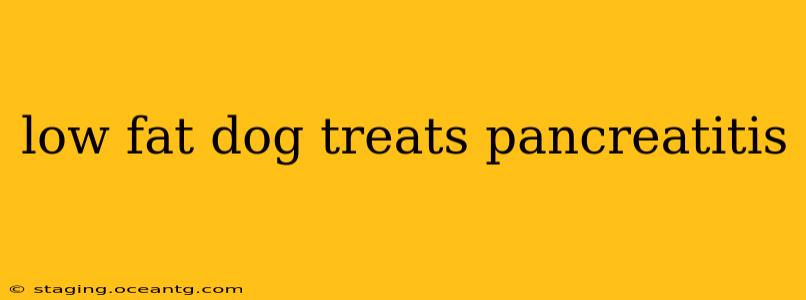Pancreatitis in dogs is a serious condition that requires careful management, including a strict dietary regimen. One crucial aspect of managing canine pancreatitis is providing appropriate treats that won't exacerbate the inflammation of the pancreas. This guide explores low-fat dog treats suitable for dogs with pancreatitis, highlighting safe ingredients and alternatives to avoid.
What is Pancreatitis in Dogs?
Pancreatitis is the inflammation of the pancreas, a vital organ responsible for producing enzymes that aid digestion and hormones regulating blood sugar. In dogs, it can range from mild to severe, with symptoms including vomiting, diarrhea, lethargy, abdominal pain, and decreased appetite. High-fat diets are a common trigger, making dietary changes crucial for recovery and management.
Why are Low-Fat Dog Treats Essential for Dogs with Pancreatitis?
High-fat foods stimulate the pancreas to produce more digestive enzymes, potentially leading to further inflammation and exacerbating the condition. Low-fat treats minimize this risk, allowing the pancreas to rest and heal. Choosing the right treats is vital for preventing flare-ups and supporting your dog's overall health.
What Ingredients Should I Look For in Low-Fat Dog Treats?
When selecting low-fat treats for your dog with pancreatitis, prioritize lean protein sources and easily digestible carbohydrates. Look for treats with:
- Lean Proteins: Chicken breast, turkey, white fish (like cod or haddock), or eggs.
- Low-Fat Carbohydrates: Sweet potatoes, carrots, green beans, or brown rice (in moderation).
- Fiber: Adding fiber can help regulate digestion and stool consistency. Look for treats containing pumpkin (pure pumpkin puree, not pie filling), or oats.
- Avoid: Fat sources like beef, pork, lamb, dairy, and most oils. Also avoid artificial colors, flavors, and preservatives.
What are Some Good Low-Fat Dog Treat Options?
While commercially available low-fat treats are becoming more common, it's always best to check the ingredient list carefully. Some options include:
- Plain, cooked chicken breast: Cut into small, bite-sized pieces.
- Steamed green beans or carrots: These are naturally low in fat and fiber-rich.
- Plain cooked sweet potato: Cut into small, manageable pieces.
- Small amounts of plain, unsweetened yogurt (check for lactose intolerance first): A good source of probiotics that can help with digestion.
Can I Make My Own Low-Fat Dog Treats for Pancreatitis?
Making your own treats offers greater control over ingredients and ensures your dog gets the best possible nutrition. Simple recipes using the ingredients listed above are easily found online. Always consult your vet before starting any new diet or treat regimen for your dog.
What Should I Avoid Giving My Dog with Pancreatitis?
Absolutely avoid the following:
- High-fat table scraps: Bacon, fatty meats, cheese, and rich leftovers are strictly off-limits.
- Treats with high fat content: Many commercial treats are loaded with fat. Read labels carefully!
- Processed dog foods: Many contain high levels of fat and fillers that can irritate the pancreas.
- Foods that cause allergies: These can worsen inflammation.
How Many Low-Fat Treats Should I Give My Dog?
The number of treats depends on your dog's size, weight, and activity level. Consult your veterinarian for personalized recommendations. It's always better to err on the side of caution and start with small portions.
My Dog has Pancreatitis - When Should I See a Vet?
If your dog shows any symptoms of pancreatitis, such as vomiting, diarrhea, lethargy, or abdominal pain, seek veterinary attention immediately. Early diagnosis and treatment are crucial for a positive outcome. Your vet will be able to accurately diagnose the condition and recommend an appropriate treatment plan, including dietary modifications.
Are there specific low-fat dog treats for pancreatitis available commercially?
Yes, several companies now produce dog treats specifically formulated for dogs with pancreatitis or sensitive digestive systems. These are usually easily identifiable in pet stores or online retailers. Always check the ingredients list to ensure it aligns with the low-fat, easily digestible recommendations.
By following these guidelines and consulting with your veterinarian, you can provide your dog with safe and delicious low-fat treats while supporting their recovery and overall well-being. Remember, consistent monitoring and adherence to a veterinarian-approved diet are crucial for managing canine pancreatitis.
